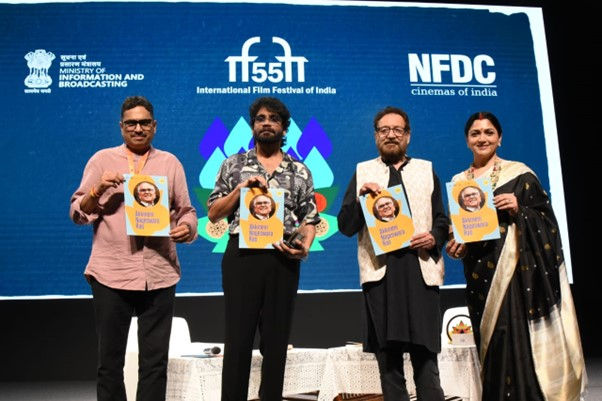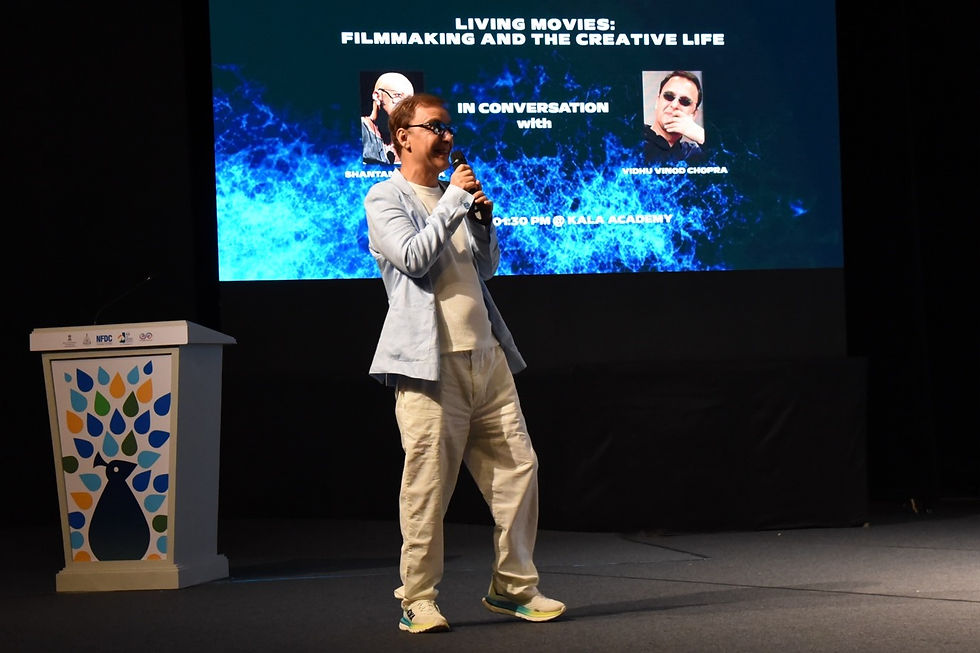Day 3 at IFFI 2024: Celebrating Regional Voices, Global Narratives, and the Art of Storytelling
- Vikram Bhargava
- Nov 23, 2024
- 4 min read
Updated: Nov 25, 2024
Day 3 of the 55th International Film Festival of India (IFFI) was a cinematic feast, filled with compelling narratives, thought-provoking discussions, and masterclasses that celebrated the past, present, and future of filmmaking. From regional gems highlighting cultural nuances to international films that bridged continents, the day reaffirmed cinema's ability to entertain, educate, and elevate. As a filmmaker, Day 3 underscored why storytelling remains a timeless and universal art.

Preserving Culture and Challenging Patriarchy: ‘Roti Koon Banasi?’
Chandan Singh’s Roti Koon Banasi?, a Rajasthani-language family drama, shed light on the struggles between tradition and gender equality. The story, set in rural Rajasthan, revolves around a young man torn between his father's traditional expectations and his desire to support his wife’s ambitions. At its core, the film addresses the generational impact of patriarchy, revealing how entrenched beliefs disproportionately affect women.
Singh, drawing from his own experiences, shared during a press conference, “Patriarchy is about the father-son relationship, and in the end, women are the victims.” His decision to make the film in Rajasthani was not just artistic but a conscious effort to preserve and celebrate regional language and culture. He added, “Cinema is a powerful tool to preserve regional languages. By making Roti Koon Banasi? in Rajasthani, I wanted to showcase our language and culture to a broader audience.”
The film's powerful message and cultural authenticity sparked meaningful discussions about tradition, equality, and the evolving role of women in Indian society.

Mythology Meets Horror: ‘Bramayugam’
Rahul Sadasivan’s Bramayugam transported audiences to 17th-century Malabar, delivering a chilling blend of mythology and folk horror. The story follows Thevan, a man fleeing Portuguese slave traders, who becomes entangled in the supernatural secrets of an abandoned manor. At the center of the narrative is the Chathan, a demon tied to the house’s ancestors, which wreaks havoc over generations, symbolizing the corrupting nature of power.
Sadasivan’s direction masterfully combines gothic atmosphere with layered storytelling. Speaking about the film, he remarked, “Bramayugam is not just a horror film. It’s about the cyclical nature of oppression and the human psyche’s vulnerability to power.” The film captivated audiences, proving that regional cinema, rooted in folklore, can have universal appeal.

Exploring the Global Lens: Cinema Without Borders
Day 3 also celebrated international narratives, featuring films from Uzbekistan, Estonia, and Serbia. Jamshid Narzikulov’s House and Boris Guts’ Deaf Lovers explored themes of resilience, identity, and the human spirit. Narzikulov emphasized, “Sincerity in human relationships is the core of our stories.” Guts echoed similar sentiments, calling cinema “a strong language that bridges divides.”

These films underscored cinema’s power to connect audiences across cultures, inviting viewers to reflect on shared human experiences.

Mani Ratnam’s Masterclass: Literature and Cinema
Legendary filmmaker Mani Ratnam’s masterclass, “Transforming Literary Masterpieces into Engaging Films,” was a highlight of the day. In conversation with Gautham V. Menon, Ratnam delved into the art of adapting literature for the screen. He emphasized the importance of preserving a book’s essence while translating its narrative into a visual medium.
Discussing his adaptation of Ponniyin Selvan, Ratnam shared, “Films are a visual medium, while books are imaginative. A filmmaker must bring a reader’s imagination to life without losing authenticity.” His insights on mythology, history, and collaborative storytelling left the audience inspired.

Despatch: Manoj Bajpayee on the Dark Side of Journalism
The screening of Despatch, featuring Manoj Bajpayee, offered a gritty exploration of ambition, corruption, and personal turmoil. Bajpayee, speaking during a press conference, reflected on the challenges of shooting during the pandemic and the mental demands of his role as a crime editor grappling with career-defining investigations.
“It’s time to mentor independent cinema,” Bajpayee remarked, emphasizing the importance of nurturing creative storytelling amidst the industry’s growing commercialization.

Cinema for Accessibility: Sabka Manoranjan
Under the theme Sabka Manoranjan, IFFI 2024 prioritized inclusivity by introducing accessible screenings, ramps, sign language interpreters, and dedicated films for persons with disabilities. Shri Prithul Kumar, Managing Director of NFDC, highlighted the Ministry of Information and Broadcasting’s commitment to promoting inclusivity in cinema. “Accessibility is at the core of this year’s festival, ensuring a welcoming cinematic experience for all,” he stated.
The initiative showcased how cinema can unite and empower people from all walks of life.

Celebrating ANR: Telugu Cinema’s Trailblazer
The day also featured a centenary tribute to Akkineni Nageswara Rao (ANR), a visionary who shaped Telugu cinema. Nagarjuna Akkineni, his son, shared heartfelt memories of his father, highlighting ANR’s commitment to making Telugu cinema a pan-Indian force. “Language should not be a barrier in cinema,” Nagarjuna emphasized, announcing plans for a documentary on ANR’s life and legacy.

Lessons from Vidhu Vinod Chopra and Shantanu Moitra
In a lively masterclass, filmmaker Vidhu Vinod Chopra and music director Shantanu Moitra shared anecdotes from their cinematic journeys. Chopra stressed the importance of passion over profit, saying, “I only make a film that I believe in. Entertain, educate, and elevate—that’s the principle we follow.”
The session highlighted the collaborative essence of filmmaking, offering valuable lessons to aspiring storytellers.
A Day of Reflection and Inspiration
Day 3 of IFFI 2024 was a celebration of cinema’s power to reflect society, preserve heritage, and connect humanity. From regional masterpieces like Roti Koon Banasi? and Bramayugam to international narratives and insightful masterclasses, the day underscored the evolving landscape of storytelling.
For filmmakers, it was a reminder of cinema’s responsibility to spark conversations, challenge conventions, and create meaningful connections. As the festival continues, the stories shared on Day 3 will linger as a testament to the timeless and transformative art of cinema.





Comments